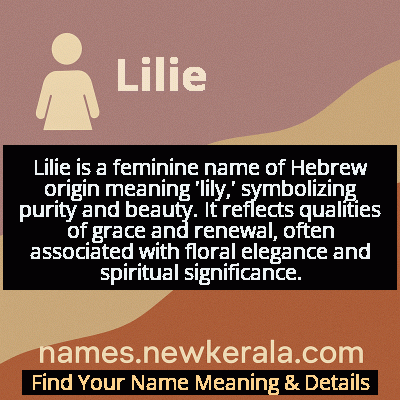Lilie Name Meaning & Details
Origin, Popularity, Numerology Analysis & Name Meaning of Lilie
Discover the origin, meaning, and cultural significance of the name LILIE. Delve into its historical roots and explore the lasting impact it has had on communities and traditions.
Name
Lilie
Gender
Female
Origin
Hebrew
Lucky Number
2
Meaning of the Name - Lilie
Lilie is a feminine name of Hebrew origin meaning 'lily,' symbolizing purity and beauty. It reflects qualities of grace and renewal, often associated with floral elegance and spiritual significance.
Lilie - Complete Numerology Analysis
Your Numerology Number
Based on Pythagorean Numerology System
Ruling Planet
Moon
Positive Nature
Diplomatic, friendly, artistic, empathetic.
Negative Traits
Over-sensitive, moody, indecisive, prone to self-pity.
Lucky Colours
Green, cream, white.
Lucky Days
Monday.
Lucky Stones
Pearl, moonstone.
Harmony Numbers
1, 3, 4.
Best Suited Professions
Diplomats, mediators, caregivers, artists.
What People Like About You
Cooperative spirit, friendliness, artistic talent.
Famous People Named Lilie
Lilie Chouliaraki
Media and Communications Professor
Renowned scholar in media ethics and humanitarian communication at London School of Economics
Lilie Saintcrow
Author
Bestselling fantasy and urban fantasy novelist known for the 'Jill Kismet' and 'Dante Valentine' series
Lilie Møller
Actress
Danish actress recognized for roles in Scandinavian television and theater productions
Name Variations & International Equivalents
Click on blue names to explore their detailed meanings. Gray names with will be available soon.
Cultural & Historical Significance
Extended Personality Analysis
Individuals named Lilie are often perceived as gentle, compassionate, and artistically inclined, with a natural grace that draws others to them. They tend to be intuitive and empathetic, valuing harmony in relationships and environments, which makes them excellent mediators and caregivers. While they may appear reserved initially, Lilies possess inner strength and resilience, often thriving in creative or nurturing roles where their sensitivity and attention to beauty can shine. Their name's floral connection may also inspire a love for nature and a tendency to seek peace and authenticity in their pursuits.
Modern Usage & Popularity
Lilie has seen a resurgence in popularity in the 21st century, particularly in Europe and North America, as parents seek classic yet unique floral names. It ranks moderately in countries like Germany, France, and the UK, often chosen for its soft, lyrical sound and connection to nature. While less common than 'Lily,' its spelling variation appeals to those desiring a distinctive twist, and it maintains steady usage in artistic and multicultural communities. Social media and literary influences have further boosted its appeal, positioning it as a elegant alternative to more mainstream floral names.
Symbolic & Spiritual Meanings
Symbolically, Lilie represents purity, renewal, and transcendence, drawing from the lily flower's association with innocence in weddings and religious ceremonies. It also embodies fertility and motherhood in some cultures, while in others, it signifies soul restoration or the balance between humility and majesty. Metaphorically, the name evokes the idea of blooming through adversity, much like the flower that rises from muddy waters unstained, making it a powerful emblem of resilience and beauty in the face of challenges.

